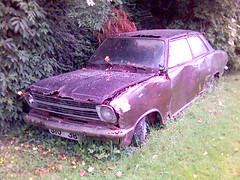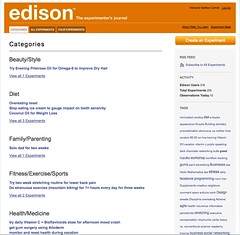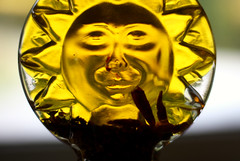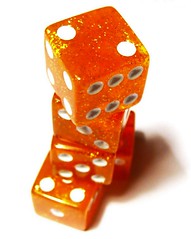
I'm always excited when someone new shares insights into living life as an experiment, so I was delighted when a reader told me about Tim Ferris's guest poster Ryan Holiday and his lovely essay The Experimental Life: An Introduction to Michel de Montaigne. In it he interprets how 16th century philosopher Michel de Montaigne's writing relates to living The Experiment-Driven Life. I thought I'd give a hearty welcome to Ryan in joining the conversation, and share my response from the Think, Try, Learn perspective.
I hadn't heard of de Montaigne before, which is not surprising given the meager literary coverage of my science background. (Should all scientists take a poetry course?)
Question: Do you know his work? Any other implications for living life as an experiment? Any other similar philosophers whose work relates to TTL?
Thanks Ryan!
(Note: You can find de Montaigne's complete 'Essais' online here.)
The self-tracking movement
At the meta level, Ryan has introduced Tim's readers to the growing self-tracking movement, and it's really exciting. People are collecting data and getting insights into themselves and the world across all domains - there are gadgets and mobile apps for everything from tracking weight, to sleep, to how much power you use, to reading, to sex. (Preferably not all at once, though - bad science.) In addition to Seth Roberts - the quintessential self-experimenter Ryan mentions on his blog (check out Will Butter Make You Smarter?) - Tim's readers may want to know about the Quantified Self blog at www.kk.org/quantifiedself/. It's hosted by senior Wired.com editor Kevin Kelly and by Gary Wolf, who wrote The Data-Driven Life in the NYTimes.
Ourselves As A Job
Exactly. What Ryan's getting at is the core idea of applying the experimental mindset to life, what I call the Experiment-Driven life. Not only can we deal with problems, challenges, and opportunities as experiments, but we can learn to be bolder and try new things. This opens up a world of experiences that for those of us don't have the Ferriss zest gene :-) It also puts mistakes and failure into healthier perspective (mistakes are natural and essential, and experimenting in life guarantees success).
Self-Experimentation and Observation
Observation is a key to treating life as an experiment, and to living happier. It does a few important things. First, it puts you into what I call a "healthy sense of detachment" - the mode of getting some distance and perspective on things by looking at them objectively. For example, this feels a whole lot better than the alternative thought (that of "Oh sh*t!"): "I just got some interesting data. What does this mean, and what do I want to do with it?" Second, it makes us more mindful. Living in the present is a key to being happy, and keen and vigilant observation - keeping your scientist eyes open - sucks you right into the moment. The key to this is keeping your curiosity alive, and the key to *that* is asking questions (one of the integral practices I talk about).
Playful relationship with existence
Adding playfulness to our lives is important, made all the harder because being too serious is an occupational hazard of growing up. From the life-as-experiment perspective, playful minds are more relaxed, and therefore more prone to see novel patterns or solutions. This helps us grow and discover more about ourselves. One way to do this is to look at the world as a "black box" where you play with poking it with a stick (i.e., sending in an input) and seeing what happens (looking at resulting outputs). You can do this with people (make yourself a detective and try to figure out what gets them excited), space (hiding, spinning, or simply taking a different route to work), or things (smelling, disassembling, or tossing, for example).
Intimate knowledge of ourselves
Yes, and not only that, it gives us the opportunity for insight and self-knowledge, which makes it easier to work in harmony with ourselves, others, and the world. Working from measurements, I call this the "enlightenment cycle": Observation leads to Awareness leads to Change. This is a much more effective route to change (the implementation of self-improvement) than a direct approach. Habit changes are a great example.
In French his word "essay" also means "trial."
This is a nice insight, Ryan. An important practice in setting up effective experiments is to treat them as *prototypes*, including making them small, focusing on the "frontier" (getting the maximum amount of information for the least amount of effort), and keeping the iterations short. (Tim is brilliant at the creativity necessary to dream up good ones, such as using ads to explore product viability.) Also, using the language of prototypes helps strengthen the muscles of the experimental mindset. Saying "Let's just give this a little try" is much less threatening (and overwhelming!) than committing to a giant effort.
Know what you're aiming for before bothering with the process
Interesting point. This brings up a contradiction I've been thinking about - how to reconcile a top-down and rigorous scientific method (state your theory, design an experiment with appropriate variables, etc.) with the more informal, personal approach of living life experimentally. My solution is a simplified version of the scientific method - the Think, Try, Learn cycle. This is more accessible to folks, and allows you to start anywhere and move around as you see fit. If you know where you're aiming, work straight through from THINK to TRY to LEARN. However, if you're not sure what you want to discover (but there are still many reasons to experiment), you might start out at TRY, for example. It's a way to gain the intimate knowledge of ourselves you mention, but not be stuck at knowing exactly where to start.
Keep a Commonplace Book
Absolutely! Ryan has discovered an important practice, one that all good scientists do, that of keeping an experimenter's journal. This is akin to a professional or personal journal (mine's a giant text file), but it's focused on tracking both the data *and* your observations of the process itself. The latter is crucial because it's where insights and self-discovery happen. Because when it comes down to it, the living is in the present; the past is gone and the future hasn't happened yet! FYI We're building an experimenter's journal called Edison, the Think, Try, Learn experimenter's journal. It's at edison.thinktrylearn.com.
Wisdom that can be accessed in times of crisis, depression or joy
Beautifully put, Ryan. From a practical perspective, those are great triggers for for reflection. I also do opportunistic discovery by randomly looking around entries when I'm searching for something specific - kinda' like stumbling on a great book on the library shelves when looking for something unrelated.
Skeptic's notion of questioning what he "knew"
Certainty is an important component of our being essentially irrational creatures. Burton's book "On Being Certain: Believing You Are Right Even When You're Not" is a nice introduction. The solution, as Ryan is getting at, is to model *yourself* by recording expectations, observing how they pan out, and doing self-correction as a result. This is not common in the "echo chamber" culture of politics, news, and blogging, and the greater climate of not being willing to admit you're wrong, or seeing changing your mind as a weakness. Much better is to adopt science's built-in skepticism and assumption that we don't (or can't) know it all.
Excuses about being too busy to do any of this
Definitely - changing how you think is hard. One way to get started is to try one or two "micro-experiments" - things like starting a one-week Media Diet, or the put-one-back technique for portion control when eating. Small things like these can help start the shift to the experimental perspective.
Quotes
Side note: I'm a collector of great quotes (jeez - over 600 of them in the big-arse), and Michel de Montaigne said some nice ones, which follow.
- Not being able to govern events, I govern myself.
- Nothing is so firmly believed as that which we least know.
- To philosophize is to doubt.
- It is good to rub and polish our brain against that of others.
- There is no conversation more boring than the one where everybody agrees.
- I prefer the company of peasants because they have not been educated sufficiently to reason incorrectly.
- There are some defeats more triumphant than victories.
- I quote others only in order the better to express myself.
- Wise men have more to learn of fools than fools of wise men.
 Monday, November 1, 2010 at 10:18AM
Monday, November 1, 2010 at 10:18AM  My current experiment in writing my book is explain how TTL is based on first principles, something I was trying to get it in my post The Experiment-Driven Life Universe v0.1. The first one, the world is constantly changing, leads to the question, "Why?" What is it about the world that makes it change? Is it the common interpretation of the Second law of thermodynamics, that is, the universe is always in motion towards equilibrium (put very roughly)? I'd love to hear your thoughts.
My current experiment in writing my book is explain how TTL is based on first principles, something I was trying to get it in my post The Experiment-Driven Life Universe v0.1. The first one, the world is constantly changing, leads to the question, "Why?" What is it about the world that makes it change? Is it the common interpretation of the Second law of thermodynamics, that is, the universe is always in motion towards equilibrium (put very roughly)? I'd love to hear your thoughts.



